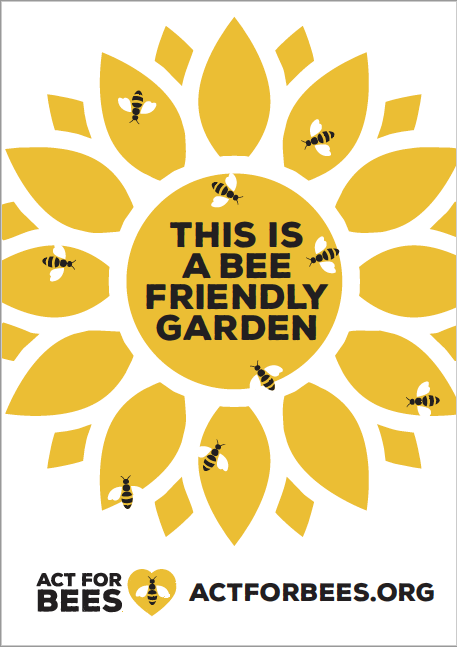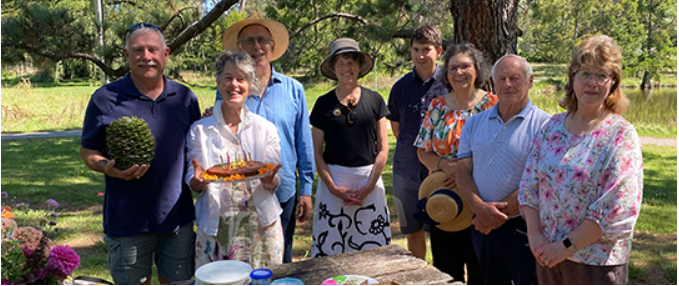 World Bee Day celebrations on Sunday May 19th 2019 World Bee Day celebrations on Sunday May 19th 2019
World Bee Day is happening again (Officially on Monday May 20th) to focus our attention on the importance of bees and other pollinators for the health of our planet and for food security. The celebration invites us to learn more about bees of all species and learn ways that we can all ‘Be Bee Friendly!’ In Canberra, the Slovenian, Swedish and Swiss Embassies are hosting the exciting lineup of activities starting at
9am -12pm at The Great Hall at Parliament House with a focus on bee research, biosecurity and international honey tasting from around the globe.
12-3pm The Embassy of Sweden 5 Turrana Street,Yarralumla
for an educational and fun filled event including a Swedish Quiz walk around the gardens with interactive educational displays, fun children’s activities including learning the bees waggle dance which tells where the best flowers are, Nordic dancing and National dress, talks on bees and what to plant in your garden and how to make bee hotels and insights into Australian native bees.
Bring your own Nudie (no rubbish) picnic to share with family and friends.Bee Registered – for your free tickets through Eventbrite . You are welcome to extend this invitation to family and friends.
3pm-6.30pm Parliament House ‘More Than Honey’ prize winning documentary hosted by the Embassy of Switzerland and be engaged by an expert panel on the challenges facing bees. Afterwards a reception hosted by the Ambassador of Switzerland. Bee registered- Free tickets through Eventbrite
Tune into World Bee Day Australia website and Facebook page and add your local event to it please!

PRE-EVENTS on Saturday 18 May 2-4pm
Ginninderry and Strathnairn Art Gallery, ANU for Bees and ACT for Bees are joining in the buzz as part of National Families week with a ‘Don’t Worry, Bee Happy!’: a celebration of bees, plants and songs with planting of a garden to attract bees, honey yummies, singing and Bee Happy activities.
90 Stockdill Drive, Holt ACT 2615Join us after you have voted. If climate action or the environment is an issue for you please look at the major party policies and make your vote count. Consider asking younger voters what their key issues are.
An interesting article in the New York times today “ My hope was to learn about the threats to bees. What I left with was an insight into the threats to democracy.” and how bees live in a truy democratic community. Thomas Seeley’s ‘Honeybee Democracy’ is a fascinating read.
If you’re not in Canberra or nearby an event, why not create your own event with friends and community and give a little back to the bees by planting some herbs or native plants in your garden or community space and sharing the joy of connection with nature, particularly with children.A new Danish 30 year study of nearly 900,000 people showed that green space during childhood is associated with better mental health, supporting efforts to better integrate natural environments into urban planning and childhood life.

Other bee news
ACT for Bees presented our submission to the ACT Government ‘Nature in Our City’ committee prior to Easter and were very pleased to be in the Canberra Times. With a warming climate and increased urbanisation, planning for significant green spaces within urban developments in the ACT with year round flowering (and not treated with pesticides harmful to pollinators) will help to support the health of the ACT’s pollinators, biodiversity and also beneficially affect human health and wellbeing. This also has a positive flow on effect to the overburdened health system.
Bavaria has just passed a ‘save the bees’ petition into law after 1.75 million signatories persuaded the German state to protect pollinators. “The proposal set a target for 20% of agricultural land to meet organic farming standards by 2025, before reaching 30% by 2030.Ten per cent of green spaces in Bavaria would have to be turned into flowering meadows, and rivers and streams better protected from pesticides and fertilisers.”
Recent studies show the seriousness of the decline of pollinators world wide. “The rate of extinction in insects is about eight times higher than the rate of extinction of vertebrates.” Dr Sanchez-Bayo found: habitat loss; pollution, especially pesticides and fertilisers; biological factors, including pathogens and introduced species; and climate change were the main drivers. Besides all the important functions that insects play in our ecosystems — such as pollination, or recycling nutrients — they are also an essential element in the food chain that supports life on our planet. When the insects go, the frogs, birds and mammals don’t have food.”
More in our ‘Love Food? Love Bees! curriculums for Early Learning, Years 5/6 and Years 9/10, particularly the 9/10 on food security and sustainable agriculture. Free to download and created with Cool Australia. Let’s create a Bee Friendly Australia!
We’ve just had beautiful new Bee Friendly flyers created and you can download a free ‘Bee friendly Garden poster for your garden from the Gardening for Bees page on our website.
Best wishes
Julie, Matt, Diane,Gerry, Rob, Meg, Warren, Robert, Steph, Peter, Nigel and Julie
The ACT for Bees team!
|

 World Bee Day celebrations on Sunday May 19th 2019
World Bee Day celebrations on Sunday May 19th 2019

 A key way to change this is by valuing food and knowing that it takes time and much nurturing to get it to the point of sale. It’s us the customers who support the farmers and growers who are healing the land by farming sustainably and regenerating the soil, the water and the biodiversity.
A key way to change this is by valuing food and knowing that it takes time and much nurturing to get it to the point of sale. It’s us the customers who support the farmers and growers who are healing the land by farming sustainably and regenerating the soil, the water and the biodiversity. 

